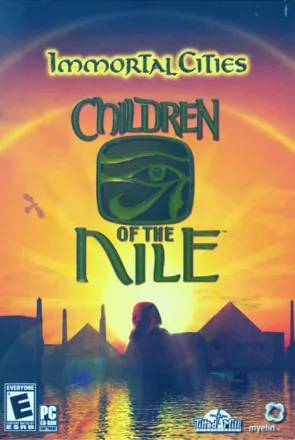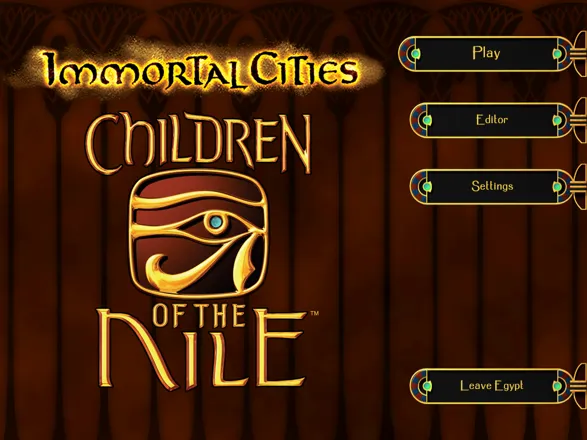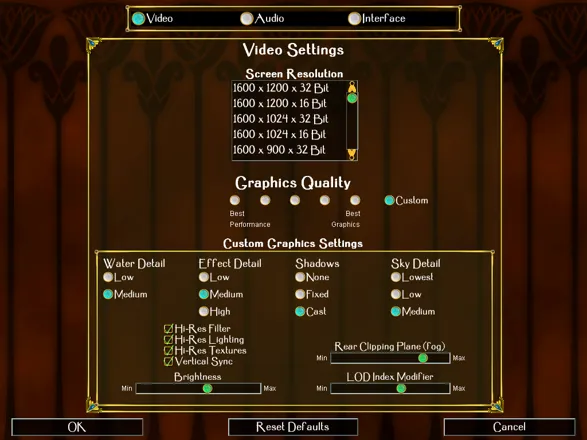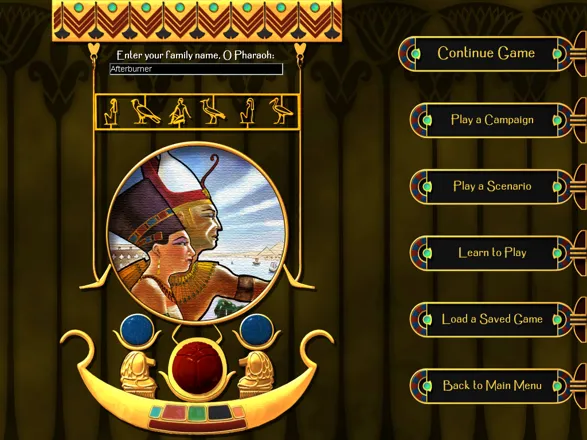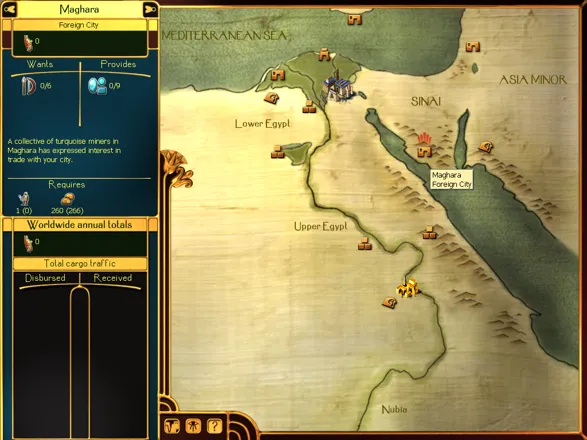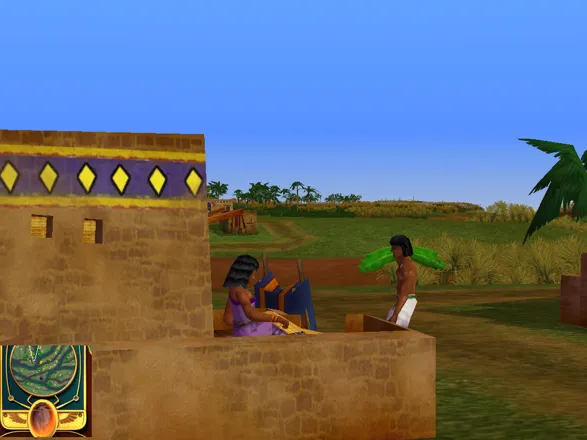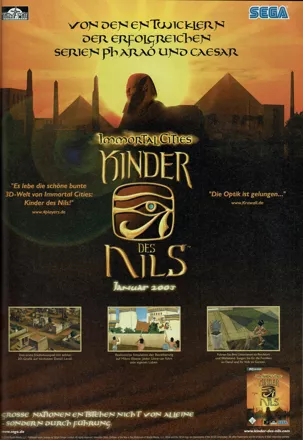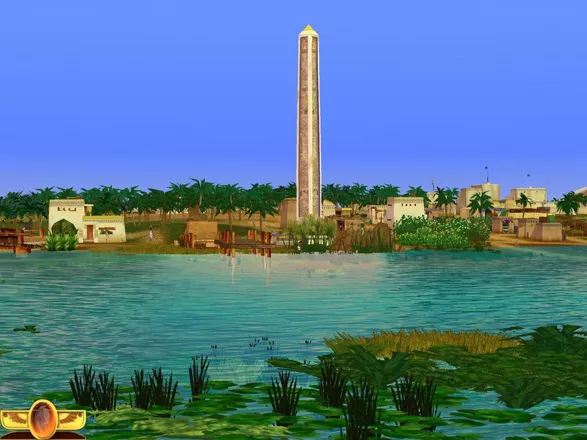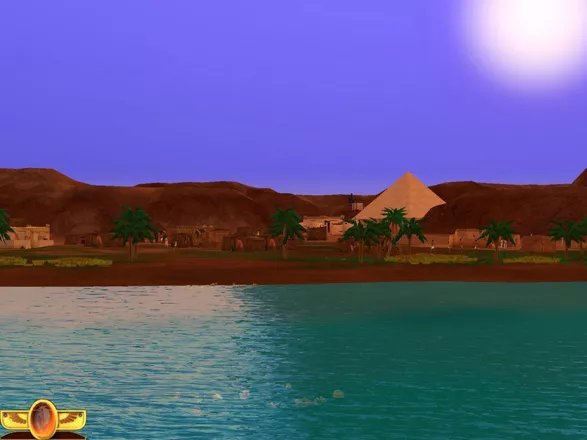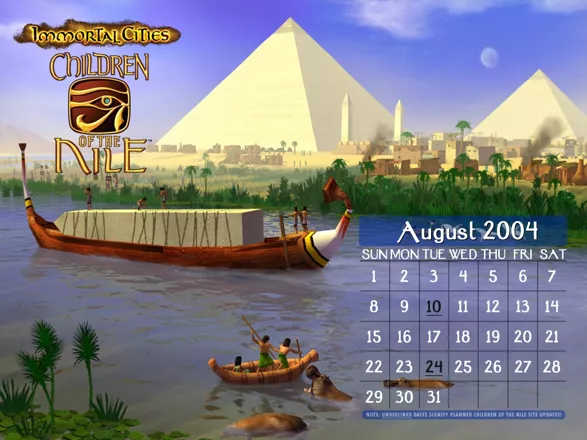Immortal Cities: Children of the Nile
Description official descriptions
In this historic city-building game by the designers of Pharaoh, set in the ancient Egypt, the focus is on the people who live in the cities. Every character behaves like an intelligent human, with their own wishes and needs. The player, as a pharaoh, cannot control them directly, but instead has to create the conditions that allow them to move up in society. Natural resources as well as the people need to be managed. By building specific structures, people can learn different skills (to become soldiers, farmers, shopkeepers, nobles, priests, craftsmen...). Eventually, larger structures like pyramids, obelisks and monuments can be built
Expanding power is achieved by conquering neighbouring nations or through diplomacy and trade. This improves your prestige, resulting in more educated workers or advanced structures. Building a mighty empire usually takes many generations of pharaohs of the same dynasty.
The game is played through a full campaign or individually selectable scenarios. A 3D engine (from Empire Earth) with zooming options is used and an editor to create your own maps, scenarios and campaigns has been included.
In 2008, the game received the Enhanced Edition update (version 1.3). This included several bug fixes, improved compatibility with Windows Vista, interface tweaks, new features (like higher resolution support and tweaked controls) and some gameplay additions (like new buildings and shrines).
Spellings
- 不朽之都:尼罗河的儿女 - Simplified Chinese spelling
Groups +
Screenshots
Promos
Videos
Add Trailer or Gameplay Video +1 point
See any errors or missing info for this game?
You can submit a correction, contribute trivia, add to a game group, add a related site or alternate title.
Credits (Windows version)
79 People (62 developers, 17 thanks) · View all
| Lead Designer | |
| Lead Programmer | |
| Designers | |
| Artists | |
| Scenario Designers | |
| Associate Producer | |
| Additional Programming | |
| Quality Assurance and Development Support | |
| Finance & Operations | |
| Producer | |
| Quality Assurance Manager | |
| Programmers | |
| [ full credits ] | |
Reviews
Critics
Average score: 75% (based on 43 ratings)
Players
Average score: 3.3 out of 5 (based on 11 ratings with 1 reviews)
Put Tropico, Pharaoh, and The Sims in a blender. Mix on high speed for 45 seconds. Serve chilled.
The Good
-The music. Keith Zizza is a god. He should be writing movie scores or something.
-The attention to detail.
-The immersiveness.
The Bad
-The AI can make some amazingly stupid decisions on an individual level. Fortunately, the game as a whole tolerates these decisions with considerable grace.
-The game, being more "sim" than "game," can be slow. Progress towards your goals takes a lot of sitting around and waiting to get enough bread, bricks, papyrus, or what-have-you.
The Bottom Line
Tilted Mill was founded by a bunch of ex-Impressions folks. Impressions, you may recall, gave us the Impressions City Building Series: The Caesar series, Pharaoh and Cleopatra, Zeus and Poseidon, and Emperor.
All of the aforementioned games are historical city builders. Thus, it's no surprise that Tilted Mill's first game is also a historical city builder. But with Children of the Nile, they attempt to take the Historical City Building genre in a new, or at least different, direction.
Children of the Nile, like Pharaoh and Cleopatra before it, takes you to the land of Ancient Egypt, a culture that survived and prospered for nearly 3000 years. (That's 15 times longer than the USA has been around, to give you some perspective.) The similarities end there, however.
In terms of gameplay, Children of the Nile plays almost identically to the Tropico games. If you like those games, you are almost certain to like Children of the Nile.
You start off most scenarios with a blank (or mostly blank) landscape, populated by villagers. The villagers live simple lives, foraging for their own food, and not doing a whole lot to increase the glory of Egypt. That's where you come in.
As Pharaoh, you decide which buildings your city needs. As the buildings are constructed, AI citizens move in, either from the original village or from other sectors of your society. A villager might become a farmer, for example, when you build a farm, and then later become a jeweler when you build a jewelry shop.
Your citizens have needs that must be fulfilled in order to keep them happy. At a minimum, your peasants need food, household wares, healthcare, and functional religious buildings. Your elite citizens need these things plus funerary services, leisure time activities, and security from both crime and invaders. Meeting these needs is the core of the game.
Like the islanders in Tropico, your little Egyptian citizens have minds of their own and cannot be directly ordered around. Within the constraints of their job and their lifestyle, they make their own decisions about where to go. A farmer with an itchy rash may decide to go to the hospital instead of working in the fields. An overseer supervising the construction of a pyramid may decide to knock off early and go to the Temple. If the farmer gets to the hospital and the attending doctor isn't around because he's having to walk halfway across the city to get food, the farmer becomes unhappy. If the overseer gets to the Temple and it's closed because the priest is out buying furniture, the overseer becomes unhappy. And while all of your citizens can tolerate a little unhappiness, people start leaving if too much builds up.
The key to most scenarios (indeed, the key to having a successful city) is managing your Prestige. You need educated elites to serve as priests, doctors, scribes, professors, and so on. But the amount of these elites who will work for you is limited by your prestige. A new Pharaoh just founding his capital city can have only 4 elite workers. Increasing this number is done by increasing your Prestige, either by building immense monuments (Pyramids, mastabas, statues, and so forth) or by accomplishing things in the wider world (circumnavigating Africa, for example, or conquering a rival city). The more educated citizens you have, the better able you are to provide for your growing city. But be warned: Prestige fluctuates. Deeds which inspired your citizens a decade ago may be but a forgotten memory now.
All in all, it's an entertaining little game, though I'd have to say it's more "simulation" than "game." It does have a high "ant farm" quotient, though, and it can be fun to watch your little citizens scurry about their daily routine.
Windows · by Afterburner (486) · 2005
Discussion
| Subject | By | Date |
|---|---|---|
| Split / alt title mix-up | Cavalary (11635) | Aug 13, 2015 |
Trivia
Pre-order bonus
If the game was pre-ordered EB or GameStop, a limited strategy disc with "behind the scenes" content was given:
- 10 in-depth movies with commentary by key members of the development team
- full music score written by composer Keith Zizza
- art gallery of never before seen concept art
- exclusive trailer
- exclusive 2005 desktop calendar
- exclusive contest to win a trip to the Luxor Hotel in Las Vegas
Rights
In early 2008, Tilted Mill Entertainment acquired the publishing rights to the Children of the Nile franchise. This led to several re-releases under their label, especially on digital gamestores.
Soundtrack
On 17 December 2004, the full soundtrack by Keith Zizza was released for free.
Analytics
Related Sites +
-
Children of the Nile (archived)
Second official website with only general information -
Children of the Nile Heaven
A detailed fansite containing game information, cheats, a forum, and a downloads section. Part of the HeavenGames network.
Identifiers +
Contribute
Are you familiar with this game? Help document and preserve this entry in video game history! If your contribution is approved, you will earn points and be credited as a contributor.
Contributors to this Entry
Game added by Sciere.
Additional contributors: Unicorn Lynx, Maw, SGruber, Plok.
Game added February 8, 2005. Last modified January 14, 2025.


